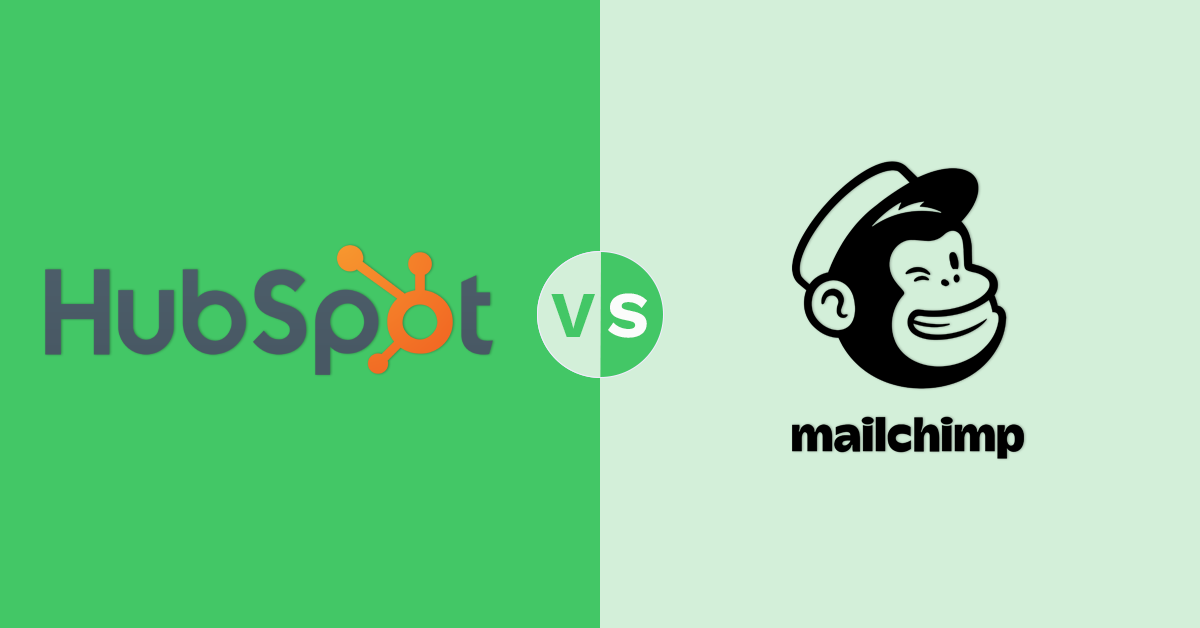
Having been around since 1998, we've seen a lot of digital marketing platforms come and go.
We've worked with most of them, giving us a great vantage point to compare which ones are right for certain scenarios.
With this in mind, we’ve watched the popularity decline for some platforms when they simply can’t adapt to new marketing pressures… and we’ve also seen some thrive during the digital revolution.
HubSpot and Mailchimp are two prominent marketing platforms that have lasted the test of time and continue to expand with new businesses around the world.
Here, we will be diving into HubSpot vs Mailchimp and assessing the key differences between the two - giving you a breakdown of which will be more useful for your business.
- What is HubSpot used for
- What is Mailchimp used for
- HubSpot vs Mailchimp: The Key Marketing Differences
- HubSpot vs Mailchimp: Who Should You Choose?
What is HubSpot Used For?
HubSpot is used as an all-in-one marketing and CRM tool that provides a business with everything needed to give its customers the greatest experience through a range of features and functionality.
HubSpot is a platform that has seen rapid growth in the last few years, delivering powerful sales, marketing and automation solutions for businesses around the world.
Their unique marketing efforts allow them to provide businesses with a varied selection of Hubs, outlined below:
- Marketing Hub: Provides everything you need to run marketing campaigns at scale. The built-in tools allow you to grow traffic, convert leads and continuously optimise campaigns; including blogging software, landing page builder, email marketing, SEO tools, ad tracking, social media management, live chat and more.
- Sales Hub: Gives sales teams easy access to automate tasks, build better relationships and close more deals. Features like email tracking, email templates, scalable personalisation, tasks and tickets help sales reps become more efficient and manage their pipeline better.
- Service Hub: Advanced customer service software with all of the tools to help businesses build strong customer relationships, like chatbots, customer portals, ticketing, SLAs and knowledge base.
- Ops Hub: Enables businesses to centralise their systems with powerful data alignment and integration features so that everything relates back to one central source of truth for cleaner, more accurate and enriched data.
- CMS Hub: Is a powerful web development platform that enables businesses to build dynamic, scalable websites that grow with your business, offering an effortless editing experience, seamless CRM integration and built-in security.
For the purposes of this article, we will mostly be comparing the features of the Marketing Hub with Mailchimp, as it's the most closely aligned platform.
You can purchase all Hubs individually, though they're more powerful paired together.
HubSpot empowers marketing teams to keep up with essential digital marketing practises, with features like a/b testing, excellent email and social media spaces, live chat for optimal customer service and the list goes on.
In the new era, you have to stay on top of all the different and new digital marketing channels and improve each function at all times for maximum results. Having elements like social media posting, website features, operational procedures, etc in one place permits your team to take a more methodical approach towards their daily goal of attracting, converting and retaining customers long-term.
What is Mailchimp Used For?
Mailchimp is used for talking to all of your customers, clients and potential prospects through marketing software. Mailchimp has become a cornerstone in many different businesses' marketing strategies and has certainly revitalised many marketing strategies in its time of being established.
Anything from creative designs to grab the attention of potential or existing customers, to a marketing automation platform that can schedule ‘send times’ for you - this platform supports you through each and every phase of being a successful business owner through marketing.
Customer data and analytics are available at additional costs with Mailchimp - giving you time to sit down and assess what areas you can double down on to increase revenue… or what margins you could potentially improve on for optimal results across the board.
Traditional marketing is no more and Mailchimp offers the ability to manage your email campaigns, create bespoke email templates, and nurture and automate your entire marketing campaigns.
HubSpot vs Mailchimp: The Key Marketing Differences
Comparing the two platforms is fairly straightforward as they offer two contrasting goals for their customers.
In this section, we’re going to break down the key differences between both HubSpot and Mailchimp within the marketing side of their company to give you a better understanding of what to expect if you’re looking to invest in either platform for your start-up or established business:
As a CRM platform
Your CRM – customer relationship management – is the foundation of your business, allowing you to organise and manage your customer relationships to build deeper connections.
Both platforms offer CRM functionality, though both originally started out as marketing platforms that have evolved over time.
Mailchimp does provide some basic CRM tools like audience dashboards, but more often than not it needs to be integrated with a more advanced CRM software.
Arguably, HubSpot has a more fully fledged CRM offering, with more tools and contact management features. This is because of the 'Hub' products mentioned previously; with some of these features across sales, marketing and service available even on the free tier.
So realistically, you can use HubSpot as both your CRM, marketing and email platform, whilst Mailchimp can provide email marketing campaign automation but will likely need to be supported by a supplementary CRM software.
The Difference in Analytics Quality
One crucial part of an effective platform for digital marketing tools is having a detailed analytics dashboard to assess where you're going right (and wrong!).
Let’s take email marketing for example… one of the most vital long-term marketing methods for creating longevity in any business.
For your email marketing campaigns, comparing your performance with different marketing techniques is essential. If you see that the open rate and click-through rate are performing much better on one email, you can double down on using that technique more.
With HubSpot, you’ll receive meticulous analytics where you’ll be able to gauge your next step - in comparison to Mailchimp, they will give you fairly basic information without any fundamental structure of what to do with the data.
The reporting functionality in HubSpot is exceptional, providing out-of-the-box dashboards across all key areas of digital marketing so that you can continually optimise campaigns.
> A high-level overview of how HubSpot Reporting works <
Email Marketing Focus
In recent times, email marketing tools have become a notable force in generating sales with email campaigns and automation increasing conversions through the likes of welcome series, abandoned carts, newsletters etc.
Email marketing is arguably the core component of Mailchimp – it's where it first started out and the majority of it's functionality lies within email marketing.
It offers substantial email templates and designs, alongside targeting tools for segmentation and automation for powerful nurturing. Additional analytics and AI features help you understand which emails perform well to optimise your campaigns.
HubSpot's email marketing tools have massively evolved in recent years to offer strong competition against Mailchimp, with an easy-to-use drag-and-drop builder meaning there's no need for designers or IT. They also leverage the CRM functionality to help you create more personalised campaigns driven by customer data.
Engaging your customers through email marketing is vital, and comparing your design and branding compared to similar brands within your niche will be a must when assessing the quality of your email marketing display.
If you compare your marketing to other companies and you’re seeing a disparity in the quality of work, you will be able to rectify that by working with the variations of templates and designs given to you.
Both platforms give a wide range of designs and templates but the availability of customisation is more prominent on HubSpot as they focus on the quality of your design. This ensures that you stand out above your competitors.
Landing Pages at a Glance
With Mailchimp gaining ground with its email marketing strategies, HubSpot certainly holds the edge as a quality landing page builder.
The sole purpose of assembling a landing page is to capture the attention of your audience and convert them to buy your product or service.
With HubSpot, you will have a more customisable range of landing pages in terms of how many templates you’re given. HubSpot's drag-and-drop design makes building pages effortless. Whereas, the standard process for Mailchimp has a fewer number of customisable templates meaning you have limited abilities to show your brand identity.
Testing opposing landing pages will allow you to portray your business from a multitude of diverse angles until you finally see the landing page that has the greatest conversion rate. HubSpot also has built-in A/B testing functionality to help with this, on advanced plans going so far as to test as many as six designs with the winning page automatically set as preference.
Social Media Integration
You can't market your business these days without social media, whether it's organic or paid, B2C or B2B. Social media tracking is also key for creating tailored advertising strategies more likely to convert.
Both HubSpot and Mailchimp provide social media integrations, so that you can schedule and upload organic content across the major platforms.
When it comes to paid media, social media tracking is key for creating a tailored advertising strategy. Either platform allows your social media advertising to integrate with your email marketing - leading to more sales through your customer journey experience.
HubSpot's Marketing Hub offers much more variation than Mailchimp when utilising social media. No matter what platform you’re on, HubSpot allows you to track the performance of your content – powerful for reporting on social media ROI.
If Google ads are your speciality, you won’t be able to connect your email list to the advertisements through Mailchimp. Yet, with HubSpot, you can connect your contact list through each and every social media platform.
Connecting your leads to HubSpot will be synced to your Marketing Hub, giving you the freedom to nurture them in the best way possible. Mailchimp on the other hand has excellent targeting for your ads in reaching your intended audience but doesn’t have the advanced integration equivalent to HubSpot.
HubSpot vs Mailchimp: Who Should You Choose?
Looking deep into all of the pros and cons of each marketing platform, it is clear to see that they offer similar services in the marketing realm.
Even though they may have different target audiences, if you have huge plans for your business moving forwards, HubSpot will be your greatest asset.
Their centralised Marketing Hub will give you everything you need as a business with multiple projects lined up to succeed with effective progression. The additional Hubs, backed by a comprehensive CRM, mean you can build out everything your business needs in one centralised platform.
Both marketing automation tools have a free plan and paid plans at affordable prices for beginners, hence, if you’re a small business or established business looking to drive sales with your marketing campaigns - start today with HubSpot for the best return on your investment.
> Read more about our HubSpot onboarding plans here <
If you'd like to learn more about how HubSpot can help your business grow, book a free consultation call at a time that suits you.
We work with organisations of all shapes and sizes, with CRM implementation, migration and integration services to suit your specific business needs.




